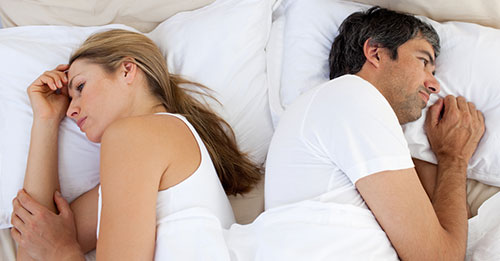Q: Is there anything that can be done naturally do boost a woman’s libido?
A: Libido in women is such a diverse topic. When you talk about men’s libido the first thing you hear about is testosterone so we naturally assume that testosterone is the magic fix for women, too. However, a woman’s libido is so much more complicated that that. After seeing women’s natural testosterone levels in high ranges suffering from low libido and women’s testosterone levels in low ranges with awesome libido, I took a step back to take a look at the bigger picture. I think libido is a combination of several items: hormones, psychological (including stress) and physical. Let’s look at each one of these individually.
Testosterone:
So let’s look at some logical pieces to testosterone. If testosterone levels are the only thing responsible for libido then the levels should be high when we are young. Problem is women’s levels are maybe only 10-20 points higher when younger. Men’s levels are different though in that they are often 500-600 points higher when younger. Women with poly cystic ovarian syndrome often have high testosterone levels and rarely do they every report increased sexual urges or interest. So clearly, for women, it’s not only about testosterone but about other hormone levels. When I speak of hormones that affect our sex drive, almost always it is our adrenal hormones that are the culprit. Our adrenal hormones are released because of stress. When are adrenal hormones are activated they release a hormone called sex hormone binding globulin (SHBG). SHBG goes and binds up all the extra sex hormones so we aren’t thinking about having sex, having a baby or even getting pregnant. This is why some women have trouble getting pregnant when they are very stressed. Often fixing the adrenals helps boost libido.
So what if your testosterone levels are very low? Testosterone can help. The higher the dose the more the effect. For some this increased libido comes with a cost of increased irritability, acne, hair growth on the face, deeper voices or hair loss on their head. When a woman gets testosterone injections or pellets these doses are always much more than our body would have produced on its own. Because of the higher doses more side effects may occur. You can also use testosterone cream topically or even vaginally in much lower doses. This usually gives a small boost usually without the extra side-effects.
Psychological:
For many women sex and everything surrounding it causes increased stress, especially when their partner is complaining they need it more. When we are stressed, sex is the LAST thing we have on our minds. It is just another thing we “have” to do. In addition, libido in women is often a lop-sided tab. If our mate isn’t very helpful that day, they don’t compliment us, they don’t help out with the house, the kids, etc we often accumulate a tab with all these reasons of why not to have sex (unconsciously, not intentionally). We also have a series of lists of things to accomplish each day before we can sleep. We are mentally and physically spent because we all know our list for the next day is just as long. Because of these lists, sex is literally not thought of and ends up as just another item on our list to do. It ranks right up there with get the laundry done and going to the grocery store. Now how much fun is that? But, what if I told you that sex can actually be a stress REDUCER? Men have made the connection (even if they don’t realize it) that having an orgasm is a stress reducer. This is why men are often more sexual when they are under more stress. Women are polar opposites. Most of us don’t think of it that way. To change that we have to understand what happens to our body when we have an orgasm. There are many positive benefits to having that “O”. Blood pressure drops, stress hormones decline, calming hormones are released and even if just for a short bit there is an increased sense of well-being. All of these occur every time. So you can see how physiologically it can be a stress release. But, when it is a duty, a check the box type of activity with no focus on what the release is all about, we often miss the benefits. Instead we are off to the next box we have to check – the laundry, the dishes, the deadline. I have an interesting exercise that helps women break the rut of sex as a stressor and starts trying to put it in the reducer category. Check it out in the next section under addressing the cause…
Physical:
This is a broad topic but when intercourse hurts it sends a negative signal to our brain that says – stop, don’t do that again. There are a variety of reasons for pain with intercourse so if you are having pain then keep looking for ways to resolve it. One reason for pain is severe vaginal dryness. There are many treatments out there for this so try them. I’m going to discuss those in the next section so be sure to scroll on down. Some women will have just severe vaginal wall spasms that make intercourse very difficult. Physical therapy can really help with this so leave your modesty at home and go find some help.
Many women just have trouble even having an orgasm. If you can’t orgasm then the reward is much lower and this causes another negative feedback loop of “why bother”. So, try to figure out the reason for this. Sensation often changes after having children or after uterine surgery like a hysterectomy or bladder issues. Positioning and stimulation are also reasons for that elusive O. You have to have the freedom to explore what works for you within your relationship and we are often programmed in believing that we shouldn’t discuss this or are embarrassed to have this conversation with our mates. You have to be able to tell them what feels good and what works. Other causes of trouble having an orgasm are medications. Antidepressants or beta blockers frequently make the ability to have orgasm difficult so take a look at what you are taking and speak to your doctor about alternatives. Not all anti-depressants have that side-effect so ask if those are right for you.
So when I work with someone on libido these are some of my core questions I ask them to think about:
1. Do you like & love your spouse?
2. Do you feel appreciated and supported by your spouse?
3. Have you ever had higher libido and if so when? Pay attention to the demands on your time in the years it was higher – chances are they were very different.
4. Do you have pain with intercourse?
5. Are you able to orgasm?
6. What are your hormone levels?
7. When you are having intercourse are you working on your to do list?
Start at the top of this list because if you don’t feel loved and supported by your spouse you can take so much testosterone that you have a full beard and may never be able to have an increased libido with that person! Work on the psychological pieces and the rest will fall into place.









